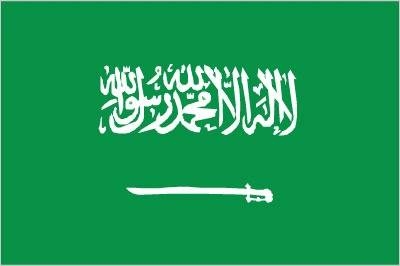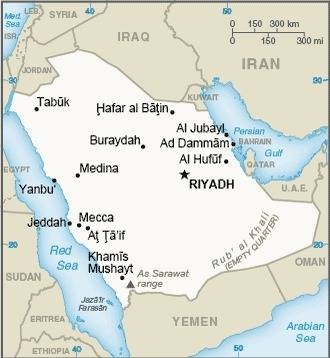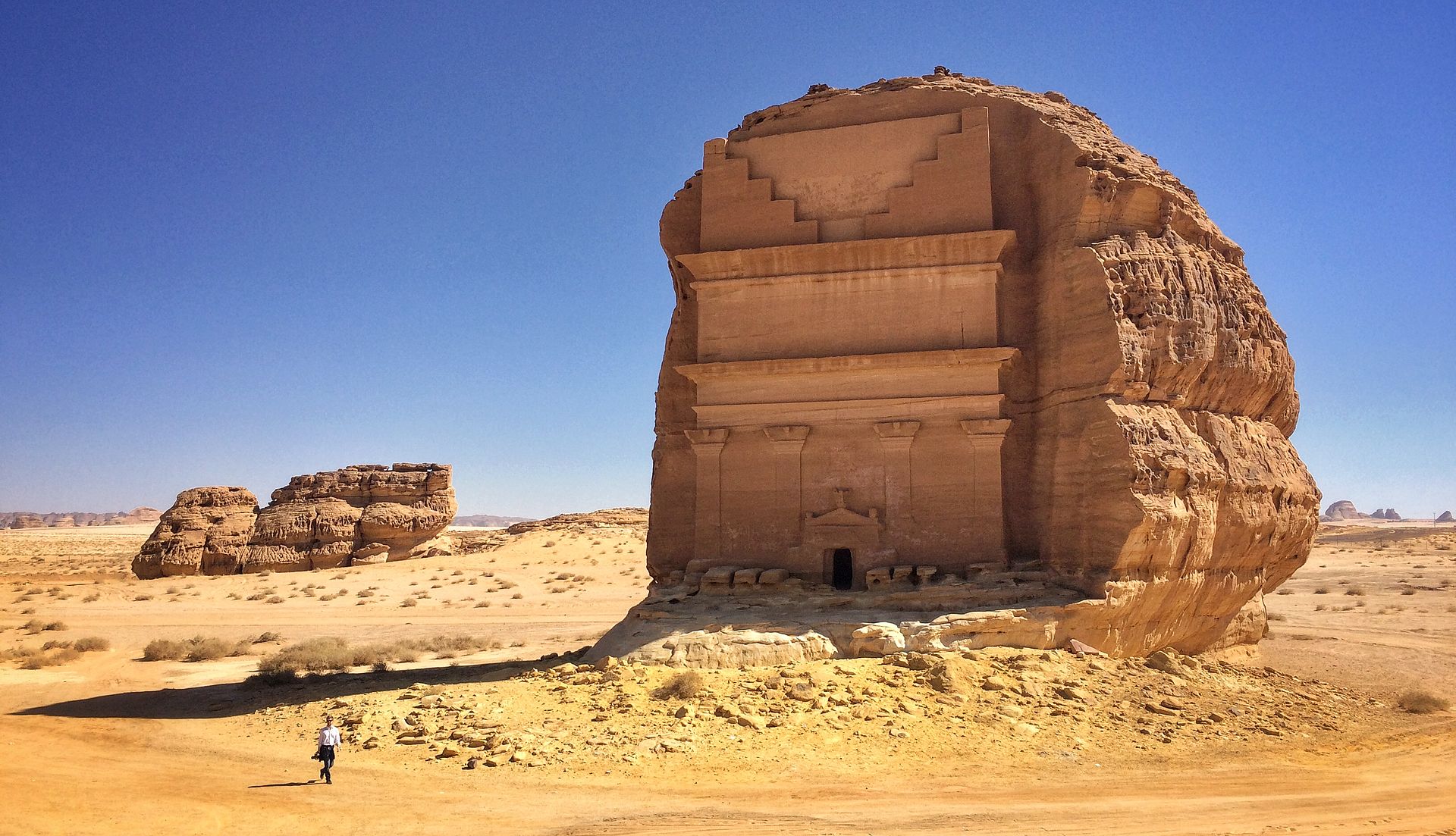162 Saudi Arabia

Green, a traditional color in Islamic flags, with the Shahada or Muslim creed in large white Arabic script (translated as “There is no god but God; Muhammad is the Messenger of God”) above a white horizontal saber (the tip points to the hoist side). Design dates to the early twentieth century and is closely associated with the Al Saud family, which established the kingdom in 1932. The flag is manufactured with differing obverse and reverse sides so that the Shahada reads – and the sword points – correctly from right to left on both sides.
Flag courtesy of the CIA World Factbook

Map courtesy of the CIA World Factbook

Qaṣr Al-Farīd, the largest of the 131 rock-cut monumental tombs built from the 1st century BC to the 1st century AD, with their elaborately ornamented façades, at the extensive ancient Nabatean archaeological site of Hegra located in the area of Al-‘Ula within Al Madinah Region in the Hejaz. A UNESCO World Heritage Site since 2008.
Government
According to Britannica, Saudi Arabia is a monarchy ruled by the Saud dynasty (Āl Saʿūd), a family whose status was established by its close ties with and support for the Wahhābī religious establishment. Islamic law, the Sharīʿah, is the primary source of legislation, but the actual promulgation of legislation and implementation of policy is often mitigated by more mundane factors, such as political expediency, the inner politics of the ruling family, and the influence of intertribal politics, which remain strong in the modern kingdom.
The kingdom has never had a written constitution, although in 1992 the king issued a document known as the Basic Law of Government (Al-Niẓām al-Asāsī li al-Ḥukm), which provides guidelines for how the government is to be run and sets forth the rights and responsibilities of citizens. The king combines legislative, executive, and judicial functions. He has typically taken on the role of prime minister, an office which presides over the Council of Ministers (Majlis al-Wuzarāʾ). The council is responsible for such executive and administrative matters as foreign and domestic policy, defense, finance, health, and education, which it administers through numerous separate agencies. Appointment to and dismissal from the council are prerogatives of the king. The Basic Law of Government paved the way in 1993 for the establishment of a new quasi-legislative body, the Consultative Council (Majlis al-Shūrā), which includes many technical experts; all members are appointed by the king. The Consultative Council has the power to draft legislation and, along with the Council of Ministers, promote it for the king’s approval.
In the end, however, all major policy decisions are made outside these formal apparatuses. Decisions are made through a consensus of opinion that is sought primarily within the royal family (comprising the numerous descendants of the kingdom’s founder, Ibn Saud), many of whom hold sensitive government posts. Likewise, the views of important members of the ʿulamāʾ (religious scholars), leading tribal sheikhs, and heads of prominent commercial families are considered.
The kingdom is divided into 13 administrative regions (manāṭiq), which in turn are divided into numerous districts. Regional governors are appointed, usually from the royal family, and preside over one or more municipal councils, half of whose members are appointed and half elected. With their councils, the governors are responsible for such functions as finance, health, education, agriculture, and municipalities. The consultative principle operates at all levels of government, including the government of villages and tribes.
Saudi Arabia has a legal system that requires all Saudi women to have a male legal guardian. The guardians have authority to make a number of decisions on behalf of women, similar to the authority a legal guardian has over a minor. Typically, a woman’s guardian is her father until her marriage, her husband during their marriage, or her brother or son if she has neither a father nor a husband. Legally, women no longer need permission to work or study, though many employers and universities continue to require permission as a condition of employment or enrollment.
Technological advances, particularly in telecommunications, have improved the efficiency of the system. Starting in 2010, permission to travel could be granted through SMS text messaging. With the emergence of smartphones, guardians were able to grant permission through a government-sponsored smartphone app called Absher. For some, this allowed women to travel more and do more without the attendance of a male guardian. But it also made it easier for male guardians to track and control women.
The Sharīʿah is the basis of justice. Judgment usually is according to the Ḥanbalī tradition of Islam; the law tends to be conservative and punishment severe, including amputation for crimes such as theft and execution for crimes that are deemed more severe (e.g., drug trafficking and practicing witchcraft).
In 1970 the Ministry of Justice was established; its work is assisted by a Supreme Judicial Council consisting of leading members of the ʿulamāʾ. There are more than 300 Sharīʿah courts across the country. Rapid changes since the mid-20th century have produced circumstances—such as traffic violations and industrial accidents—not encompassed by traditional law, and these have been handled by the issuance of royal decrees. These decrees have evolved into a body of administrative law that is not directly drawn from Islamic precepts. Avenues of appeal are available, and the monarch is both the final court of appeal and the dispenser of pardon.
General Authority of Civil Aviation of Saudi Arabia (GACA)
The General Authority of Civil Aviation of Saudi Arabia (GACA) is responsible for regulation of air transport services and the implementation of civil air regulations, air safety and airworthiness standards. It also co-ordinates all regulatory functions with ICAO. The headquarters is in Riyadh. The GACA emerged from the Presidency of Civil Aviation (PCA) that was created when the institution controlling aviation was split into a civil department and the Royal Saudi Air Force. The PCA was among others also in charge of the Saudi Arabian Airlines and the Meteorology Department. The Saudi Arabian Airlines was split from the PCA in 1960 and became an independent public institution in 1963. The Meteorology Department became an independent institution with own budget in 1966. The name of the PCA was changed to General Authority of Civil Aviation in 1977. In late December 2011 the GACA was separated from the ministry of defense and was attached directly to King Abdullah. Following this reorganization King Abdullah appointed Prince Fahd bin Abdullah bin Mohammed as the head of the GACA.
Airspace
SkyVector – Google Maps – ADS-B Exchange
ICAO countries publish an Aeronautical Information Publication (AIP). This document is divided into three parts: General (GEN), En Route (ENR) and Aerodromes (AD). ENR 1.4 details the types of airspace classes they chose to adopt from classes A through G.
SANS
Drone Regulations
UAS Laws – registration – requires password
GACAR PART 107 – OPERATION OF UNMANNED AIRCRAFT SYSTEMS
Advanced Air Mobility (AAM) Regulations & Policies
2024
Saudi Officials Seize the Initiative with Early eVTOL Air Services
GACA maps out development of AAM in Saudi Arabia
Enabling AAM in Saudi Arabia – Roadmap
Bilateral agreements facilitate the reciprocal airworthiness certification of civil aeronautical products imported/exported between two signatory countries. A Bilateral Airworthiness Agreement (BAA) or Bilateral Aviation Safety Agreement (BASA) with Implementation Procedures for Airworthiness (IPA) provides for airworthiness technical cooperation between the FAA and its counterpart civil aviation authorities.
Flight Standards Agreements
Article 83 bis Agreement
Article 83 bis agreement is an agreement between two Contracting States that have ratified Article 83 bis, in terms of which the State of Registry transfers all or some of its functions and duties to the State of the Operator.
Advanced Air Mobility (AAM) News
2025 – US government clears $1B support deal for Saudi Arabia
2025 – Joby, RSG, THC partner on air taxi sandbox in Saudi Arabia
2025 – Saudi Regulator To Accept FAA Approval for Joby’s eVTOL
2025 – GACA to speed eVTOL regulations for Joby air taxi service
2025 – Boeing partners with GACA on advanced air mobility
2025 – LYNEports, Dunes Aero partner on AAM in Saudi Arabia
2025
Video courtesy of Advanced Air Mobility Institute from the July 2025 Global AAM Forum.
2025 – FlyNow to highlight air taxi in Saudi Arabia
2025 – Abdul Latif Jameel partners with Joby Aviation in Saudi Arabia
2025
Video courtesy of Advanced Air Mobility Institute from the January 2025 Global AAM Forum. Complete session for Day 3 of this Forum is available on the Advanced Air Mobility Institute YouTube Channel
2024 – UrbanV, Cluster2 partner on AAM ecosystem in Saudi Arabia
2024 – Lilium reaches eVTOL regulatory agreement with Saudi Arabia
2024 – Saudia Group buys 50 Lilium Jet eVTOL aircraft
2024 – UrbanV, ICAD partner on vertiports in Saudi Arabia
2024 – EHang demos EH216-S eVTOL in Saudi Arabia
2024 – Eve, Saudia Technic to develop eVTOL MRO services in Saudi Arabia
2024 – Joby Partners to Introduce eVTOLs to Saudi Arabia
2023 – Volocopter, NEOM complete electric air taxi flight in Saudi Arabia
Short Essay Questions
Scenario-Based Question
You have been hired by a Drone Startup Company. Your boss has immediately assigned this job to you.
They need you to prepare a one-page memo detailing the legalities of using a drone to film the monumental tombs, pictured above.
They need you to mention any national laws and local ordinances.
They specifically want to know what airspace (insert pictures) you will be operating in and whether or not you need an airspace authorization.
Does it matter whether or not you are a citizen of the country?
Lastly, there is a bonus for you if, as you scroll through this chapter, you find any typos or broken links!
Short Essay Questions
- What are the drone categories?
- How is registration addressed?
- How is remote ID addressed?
- What are the model aircraft rules?
- What are the commercial drone rules?
- Are there waivers or exemptions to the rules? If so, for what?
- Would you share a link to an interactive airspace map?
- How is BVLOS addressed?
- How can you fly drones at night?
- How can you fly drones over people?
- Where do you find drone NOTAMs?
- What are the rules for drone maintenance?
- What are the rules for an SMS program?
- What are some unique rules not mentioned above?
- What are the C-UAS rules?
- What are the AAM rules?

